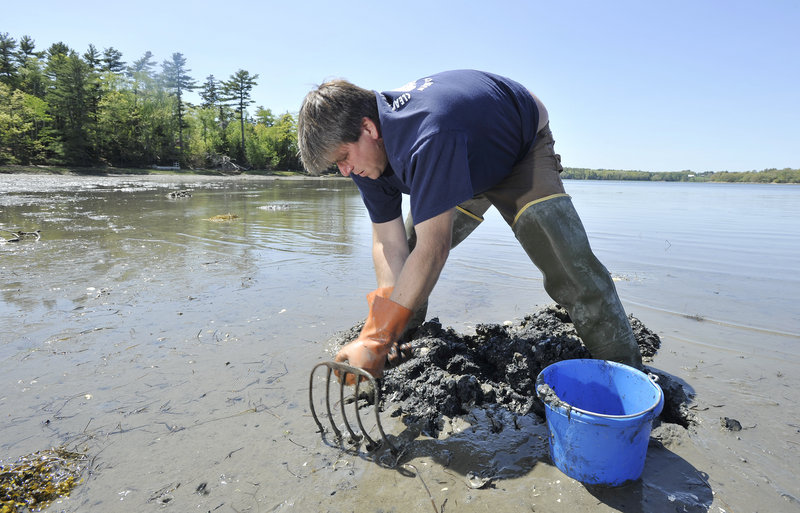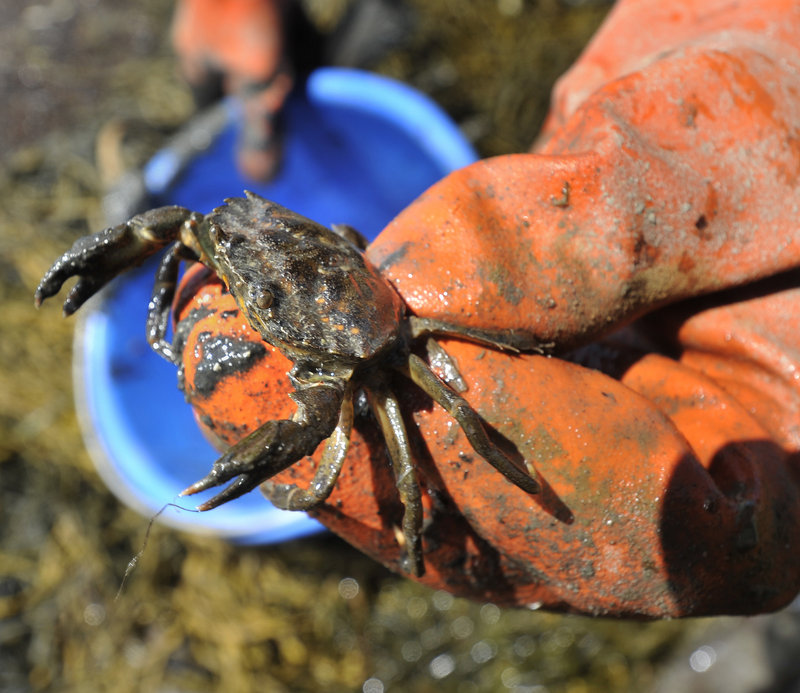FREEPORT – There’s an army of green crabs hunkered down in the channels of the Harraseeket River and Recompence Cove, and every night they skitter up onto the mud flats to feast on whatever shellfish they can find.
They’ve munched their way through most of the wild mussels, scallops and snails along the town’s 27-mile coast, and now they’re working on wiping out one of Maine’s prime soft-shell clam populations.
To combat this small but destructive creature, the Freeport Shellfish Commission is launching the first municipal shellfish conservation program in Maine. Its goal is to reduce predators, protect and enhance existing shellfish beds and diversify the bivalve species growing in nearly 180 acres of mud flats, more than half of which are currently unproductive.
Local clammers hope to save and expand a natural resource that supports 45 families in Freeport and entice other coastal communities that face similar devastation to join the fight.
“We’re at war and we’re not giving up,” said Chad Coffin, a commission member who is president of the 800-member Maine Clammers Association.
Town officials plan to spend as much as $500,000 over the next five years to buy traps, nets and other gear and hire staff to manage the program and gather data. The Town Council allocated the first $100,000 in this year’s capital improvement budget.
“This initiative has two important goals: job creation and the restoration of a natural resource,” said Councilor Sara Gideon, who supported the funding. “It’s an example of a partnership between the town and an industry that has already proven itself to be a leader on water quality issues.”
The town’s effort is welcomed by the cash-strapped Maine Department of Marine Resources and its Shellfish Management Program, which monitors coastal water quality, manages bed closures and reviews shoreland development for environmental impacts.
“(We are) committed to supporting and assisting this ground-breaking venture within the state of Maine,” Denis-Marc Nault, supervisor the state’s program, wrote in a letter to the Town Council.
Similar programs on Cape Cod, Martha’s Vineyard and Nantucket have resulted in “a steady increase in shellfish harvest and economic gains to the community as a whole,” Nault wrote.
The number of green crabs in Maine waters has spiked in recent years as fin-fish stocks have declined, reducing the number of predators that might keep the crab population in check, according to Coffin and other clammers. Warmer coastal water temperatures and a lack of winter ice along the shore also promoted green crab growth.
The shellfish conservation program also will include advanced water quality testing to determine the DNA of fecal coliform and help environmental officials figure out the source of pollution, such as failed septic systems or farm runoff.
Nets will be used to keep crabs out of productive clam flats, which range from Bowman Island to Flying Point, Coffin said. Traps will be used to catch crabs in shallow waters and remove them to a local landfill, where they will be composted.
Clammers involved in the conservation program are hoping to develop a market for the crabs, possibly as lobster bait, food additives and pet food.
To further reduce the crab population, clammers will be asked to carry a small extra bucket, cut from a plastic milk jug, to hold any crabs they find while digging, Coffin said.
Throughout the program, the commission plans to gather data to determine how pervasive the crabs are and learn more about their feeding and reproductive habits. Armed with concrete information, the commission plans to apply for grants to help offset the cost to taxpayers.
“We know we have a problem,” Coffin said. “We don’t know the scope of it.”
If the conservation program is successful, shellfish commissioners hope Freeport’s clam beds will be able to support more clammers. They’d also like to reintroduce mussels and scallops to the area, and maybe bring in quahogs, a hard-shell clam more common from Massachusetts south that’s been doing well lately in Maine’s warmer waters.
“Right now, too many of our flats are unproductive,” said Walter Coffin, a Freeport clammer and Chad Coffin’s cousin. “We’d like to change that.”
Staff Writer Kelley Bouchard can be contacted at 791-6328 or at:
kbouchard@pressherald.com
Send questions/comments to the editors.




Success. Please wait for the page to reload. If the page does not reload within 5 seconds, please refresh the page.
Enter your email and password to access comments.
Hi, to comment on stories you must . This profile is in addition to your subscription and website login.
Already have a commenting profile? .
Invalid username/password.
Please check your email to confirm and complete your registration.
Only subscribers are eligible to post comments. Please subscribe or login first for digital access. Here’s why.
Use the form below to reset your password. When you've submitted your account email, we will send an email with a reset code.